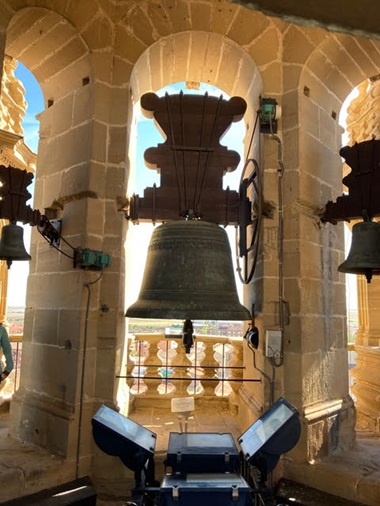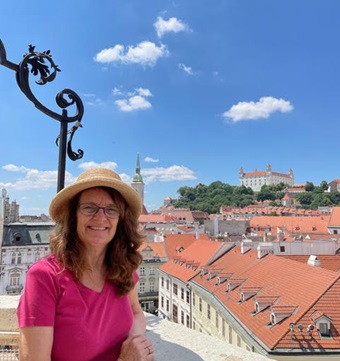 When I was a university student, a cleverly engineered carillon warned me I might be late as I biked past it on my way to class. The bells played different tunes at each quarter hour, and at noon a small crowd would gather round the glass tower to watch the mechanism produce a short bell concert.
When I was a university student, a cleverly engineered carillon warned me I might be late as I biked past it on my way to class. The bells played different tunes at each quarter hour, and at noon a small crowd would gather round the glass tower to watch the mechanism produce a short bell concert.
Years later, when I arrived in my Kitsilano neighbourhood, I was charmed by the bell that called my children to class each morning and released them into our care each afternoon.
For one school year our family lived in a small village high in the French Alps. There, our life was similarly ordered by the ringing of the ancient church bell in the town square – but I was mystified by the occasional clanging of the otherwise predictable bell. Dong . . . dong . . . dong, sometimes dozens of peals, followed by a silence that itself was almost audible.
As my relationships in the village deepened, and village ways became less mysterious, I learned that the bell tolled to announce that someone in the village had died. My neighbours often discerned who had died by counting the bell tolls, one for each year the deceased person had lived. Although I never knew all the villagers well enough to determine who had died, I did begin holding my breath when the bell was rung, hoping it would not go silent after merely a few or few dozen peals.
Public theology
In January Tim Dickau wrote about an experiment in public theology here in Vancouver. He explained that “public theology engages the challenges and issues impacting our society, offering a perspective shaped by our understanding of the world created and being restored by God.”
Tim described those of us who have come together to join in this experiment as “a group with denominational, vocational and ethnic diversity [including] . . . a lawyer, pastor, non-profit leader, academic/educator, community developer, nutritionist and conservationist; from Catholic, Mennonite, Baptist, Pentecostal, Vineyard, Anglican and Presbyterian backgrounds; with Chinese, Indigenous, Latin American and other ethnic backgrounds.”
Our shared goal is to join the conversation, offering diverse perspectives through a common lens of Christian faith. But what to call ourselves?
Shared life
We have chosen The Bell as our name because it resonates with a sense of shared life. In an age when each of us could easily take refuge in our own circles, removing ourselves from a broader community of engagement and concern, The Bell affirms that we in Vancouver inhabit a place and a community together.
We are called together, like children called to school from different households, into many shared projects and pursuits; we believe our mutual flourishing is better pursued together and in conversation than alone or within factions.
One hope
We have also chosen The Bell in hope that we might ring out above the clamour, offering perspectives into a wider conversation.
As our tagline Diverse Christian Voices in Vancouver suggests, we are not all in accord with one another. We offer many perspectives, not one. But we are tethered to a shared centre: our faith in Jesus. We believe in one good Creator God, and we believe that apart from God’s mercy and grace, our best efforts to promote a community in which all thrive will always fall short of our ideals.
Together we proclaim one hope for all: the incarnation, life, death and resurrection of one real person in history – Jesus of Nazareth. Up against war, environmental degradation, corruption, interpersonal conflict, complex ethical dilemmas and competing valid interests, our humanist striving and resolve prove insubstantial and insufficient to establish and restore a flourishing community.
So we cling to Jesus’ all-sufficiency, and we respond to His call to participate together in such restoration. Here again our diversity emerges: how we are called and equipped to participate varies.
Identify as Christian?
The decision to include Christian in our self-description was a matter of some debate. While I unabashedly identify as a Christian, I admit to having some misgivings about using Christian as an adjective rather than as a noun.
The term was first used to name a more inclusive community, to incorporate believing Gentiles into the nascent church that was initially comprised of Jews only. Christian means ‘little Christ’ and refers to our belief that we join our lives to Jesus – to His life, death and resurrection.
Christians are called, instructed and generally intend to imitate Christ, but it is not our intention to do so that warrants our name. Moreover, we are not named Christians because of anything we do or intend to do, but because of what Christ has done, continues to do and intends to do in us.
Christian is a noun. And I am uncomfortable with its usage as an adjective, as it could seem to imply that one might be more or less Christian-ish, or that some thing might be described as Christian-y.
We employ Christian as an adjective, however, to clarify what unifies our diverse voices, why though we may disagree or have differing perspectives on many issues, we enter and speak into the public square together, oriented by shared fundamental convictions.
Communal life
One might argue that nothing was lost when our elementary school’s principal replaced the school bell with an automated buzzer. And surely there would be an outcry among alumni if the mechanical carillon at the heart of my alma mater were programmed and plugged in. But couldn’t Facebook accomplish what church bells have done for generations in villages?
When these changes occur, we mourn not merely from a sense of nostalgia but because our community has become less personal by a degree or two each time the human element of engagement is diminished.
When the grade five student is no longer called upon to summon her school mates by ringing the bell because an administrator can push a button, when no one has reason to gather at noon to watch the carillon’s levers move by themselves, when no one is called upon for the somber duty of pulling the cord in the bell tower because all of the villagers can learn of a neighbour’s death on their own screens when they happen to log on or check their phones, our communal life becomes a bit more fractured and reduced to function.
Robust conversations
As The Bell, our longing is to strengthen our community by promoting robust conversations around issues of concern to all of us here in Vancouver. We offer our perspectives and invite response and deeper engagement.

Susie Colby
We’ve already shown our hand – we don’t believe that honest and civil conversation alone will produce a utopian city. But we do believe we can pursue mutual flourishing together, so we are ringing The Bell.
Tim concluded his introduction: Like all fruitful public theology, we hope [these pieces] will spark public, hospitable and mutually edifying debate. Read them, debate them and spread them around!”
Susie Colby has held many roles in InterVarsity Christian Fellowship. She has lived in Vancouver for over 20 years, and with her late husband Steve raised three kids and a few pets here. This land where everything grows and blooms feels like home.

homonym violation alert – principal is not principle – silent fix request
One might argue that nothing was lost when our elementary school’s principle replaced the school bell with an automated buzzer.
Thank you Joseph. My fault; made the change. Good to know The Bell can count on careful readers.
Please say more about how The Bell actually ‘functions.’ Are there regular meetings? Are others invited to listen and/or to engage? Is there a particular place where The Bell ‘hangs?’ from where it tolls? Will public pronouncements be made (press releases)? What is the relationship with the churches, with city council, with other institutions (schools, universities, etc.)?